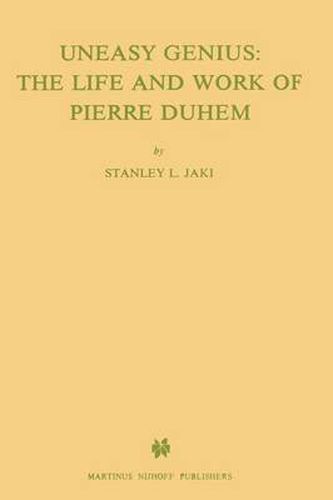Readings Newsletter
Become a Readings Member to make your shopping experience even easier.
Sign in or sign up for free!
You’re not far away from qualifying for FREE standard shipping within Australia
You’ve qualified for FREE standard shipping within Australia
The cart is loading…






This title is printed to order. This book may have been self-published. If so, we cannot guarantee the quality of the content. In the main most books will have gone through the editing process however some may not. We therefore suggest that you be aware of this before ordering this book. If in doubt check either the author or publisher’s details as we are unable to accept any returns unless they are faulty. Please contact us if you have any questions.
A hundred years have now gone by since in the midsummer of 1882 Pierre Duhem, a graduate of College Stanislas, completed with brilliant success his entrance exams to the Ecole Normale Superieure and embarked on his career as a theoretical physicist. His father, a textile salesman, hoped that Hierre would pursue a career in business, one of the few professional fields where perhaps he would not have succeeded. Not that young Duhem lacked sense for the practical. He could have easily made a name for himself as an artist had he developed professionally his skill to draw portraits and landscapes. His ability to make a point and his readiness to join in a debate, could have earned him fame as a lawyer. A potential actor was in sight when he entertained friends with mimicry. That as a student of physics he entered and stayed first in his class at the Ecole Normale, did not thwart his talents for the life sciences. No less a biologist than Pasteur tried to obtain Duhem for assistant. His command of Greek and Latin would have secured him a career as a classicist. He was a Frenchman, not to be met too often, whose rightful ad miration for and mastery of his native tongue, did not prove a barrier to the major modern languages. As one who taught himself the complex art of medieval paleo graphy, he could easily have mastered the many auxiliary sciences needed by a consummate historian.
$9.00 standard shipping within Australia
FREE standard shipping within Australia for orders over $100.00
Express & International shipping calculated at checkout
This title is printed to order. This book may have been self-published. If so, we cannot guarantee the quality of the content. In the main most books will have gone through the editing process however some may not. We therefore suggest that you be aware of this before ordering this book. If in doubt check either the author or publisher’s details as we are unable to accept any returns unless they are faulty. Please contact us if you have any questions.
A hundred years have now gone by since in the midsummer of 1882 Pierre Duhem, a graduate of College Stanislas, completed with brilliant success his entrance exams to the Ecole Normale Superieure and embarked on his career as a theoretical physicist. His father, a textile salesman, hoped that Hierre would pursue a career in business, one of the few professional fields where perhaps he would not have succeeded. Not that young Duhem lacked sense for the practical. He could have easily made a name for himself as an artist had he developed professionally his skill to draw portraits and landscapes. His ability to make a point and his readiness to join in a debate, could have earned him fame as a lawyer. A potential actor was in sight when he entertained friends with mimicry. That as a student of physics he entered and stayed first in his class at the Ecole Normale, did not thwart his talents for the life sciences. No less a biologist than Pasteur tried to obtain Duhem for assistant. His command of Greek and Latin would have secured him a career as a classicist. He was a Frenchman, not to be met too often, whose rightful ad miration for and mastery of his native tongue, did not prove a barrier to the major modern languages. As one who taught himself the complex art of medieval paleo graphy, he could easily have mastered the many auxiliary sciences needed by a consummate historian.